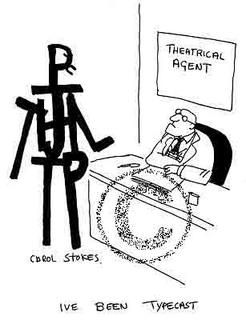
To : Myself, 20 years from now
Subject: What happens to Model - T?
From: Me, Today
Hi:
Today, I am departing from the traditional gaze into the oracle and am taking a break from wondering what Man will do to Man. Instead, I'm turning the spotlight inward.
Why do we maintain journals in the public domain? I wonder if its for the same reason that criminals like to leave clues - because deep down, we all want to be found out.
If so, what is in hiding that I'd like to be brought to the surface? The more I ask, more the criminal in me returns a cryptic reply - "I don't know".
You know as well as I do that everything immoral, illegal and fattening has happened; all that needed to be destroyed - well, the needful has been done. Interestingly, I never did pick up the pieces. I just brushed them aside and built another model, each time with a stronger immunity system and able to brush off the latest viral attacks.
And then I waited - for the model to be destroyed again. Each time, the Weapons of Mass Destruction were different - excessive lifestyles, betrayal by those trusted implicitly, 100-hour work weeks, collapsing health, sex, lies and videotape etc.
You'll be proud to know that the latest model, Model - T, has doubled productivity and puts in only fifty hour work - weeks. Sixty, tops. Took a lot longer to make than I envisaged, but the project is very nascent, the model very much a work - in - progress. Model - T has newfound self-respect, but that process has, sadly, been accompanied by a near total loss of respect for several people, values and ideas that the earlier model knew.
Inspite of that, there has been considerable progress in making peace with the past. Convenient memories, faded images and incredible darkness had to be forcibly scythed to forge a path ahead, and that came at a dear price. Someday, perhaps, I'll reconcile differences and re-build all that has been razed. Then again, maybe it's not that important. Either way, the piper in me plays on.
Until then, what becomes of Model - T?
Regards,
________________________
To : Myself, Now
Subject: Re: What happens to Model - T?
From: Me, 20 years from now
Hey:
Am busy with the orphanage and don't have much time to frame a reply. I can only quote what the Wise had to say.
As a wise man once wrote - they can't touch Model - T, because Model - T has a sound mind in a pure body and is as strong as an ox. They can't touch Model - T because it is Tarzan, Mandrake, Flash Gordon. It is Bill Shakespeare. It is Cain, Ulysses, the Flying Dutchman; it is Lot in Sodom, Deirdre of the Sorrows, Sweeney in the nightingales among trees. It is miracle ingredient Z - 247.
It is immense. It is a real, slam - bang, honest - to - goodness, three - fisted humdinger. Model - T is a bona fide supraman.
Now, if you'll excuse me, have to check on the soup and math homework.
Regards,
________________________
To : Myself, 20 years from now.
Subject: Re: Re: What happens to Model - T?
From: Me, Today
Bastard :-)











